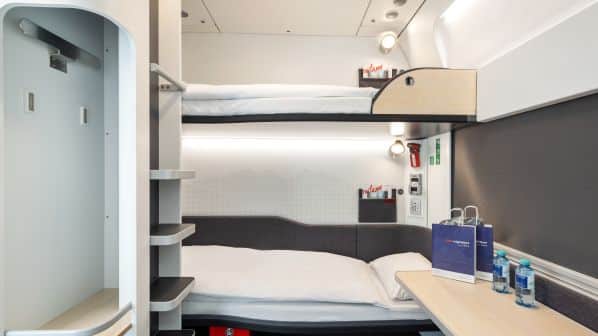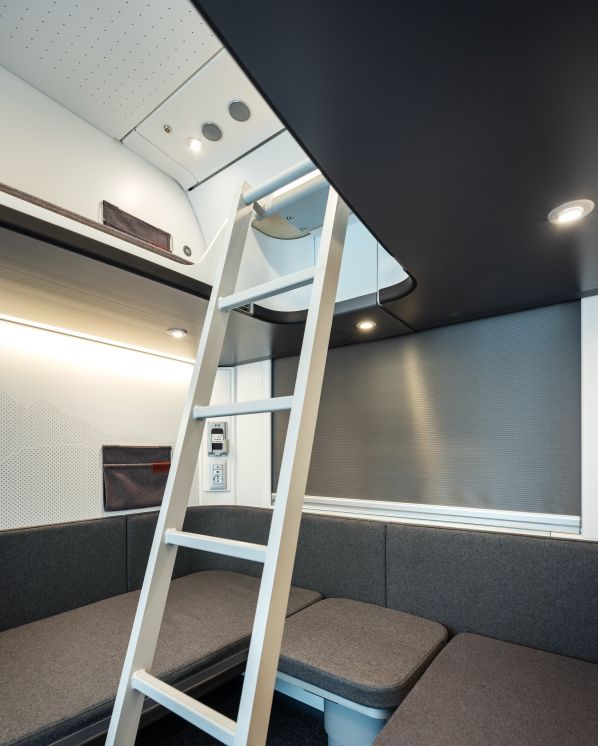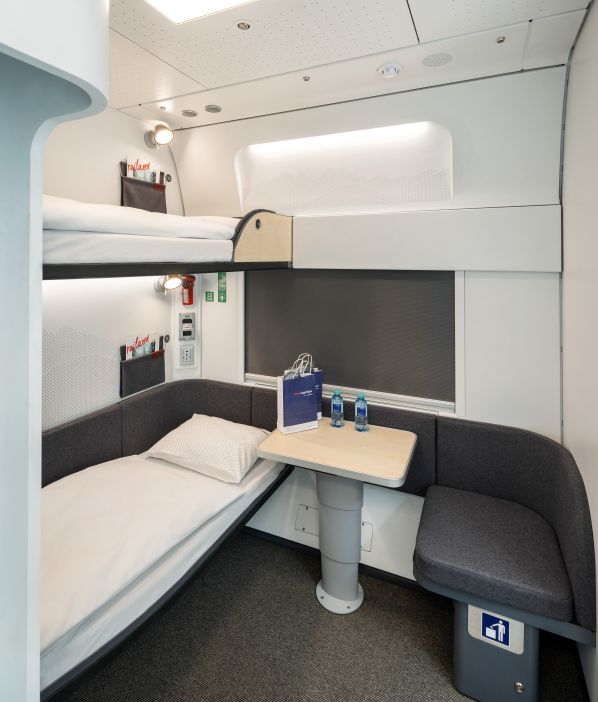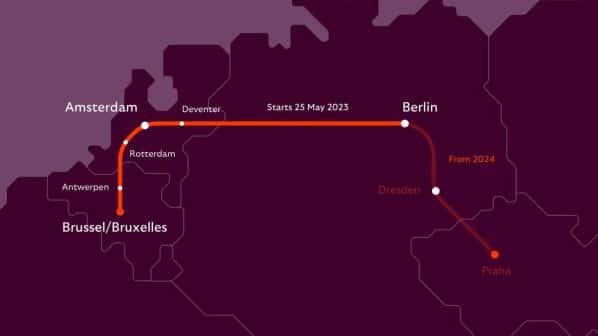THE introduction of low-cost flights in the 1990s and the steady expansion of high-speed train services spelt the end of the “peak period” for night trains across Europe. The once vast network was slowly but surely cut back as national railways instead focused on providing faster daytime services.
The persistence of Austrian Federal Railways (ÖBB), which kept operating its own routes and took on some from its previous partners, including notably German Rail (DB) in 2016, is now paying off with services booked out months in advance and ÖBB steadily expanding its reach.
“For us it was a quite important market,” says ÖBB spokesman, Mr Bernhard Rieder. “It was not easy at the beginning, because we lost all our partners, but it turned out to be a good decision. What we see now is all the companies that stepped out of the business trying to come in again, but this time as a partner to us.”
The Covid-19 pandemic initially caused major disruption to night trains, but the ability to travel long distances in a personal cabin instead of seated on a plane with hundreds of other passengers has since boosted popularity. ÖBB’s Nightjet services have almost completely sold out since the middle of April 2022, and Rieder says it could have doubled capacity at peak times if it had sufficient rolling stock to meet demand.
The lack of sleeper trains meant ÖBB opted to extend its existing services to new destinations rather than introduce new trains under the new European timetable that came into force on December 11 2022.
For example, the Vienna - Munich service now continues to the Italian Riviera, extending from Milan to the Ligurian cities of Genoa and La Spezia. Stuttgart has also been newly connected via an extension of the Venice - Munich train.
In addition, EuroNight trains from Budapest in Hungary and Zagreb and Rijeka in Croatia now run to Baden-Württemberg, while the EuroNight service from Vienna and Graz to Split will connect with the Croatian Adriatic coast three times a week from the beginning of May until October.
New entrants
With so much interest in the overnight market, smaller operators are beginning to explore ways to enter it. European Sleeper announced at the end of December that it will launch its first overnight service from Brussels via Antwerp, Rotterdam, Amsterdam and Deventer to Berlin on May 25. But like ÖBB, the company’s ambitions have been hindered by the lack of available rolling stock, which forced it to delay the launch of a Brussels - Amsterdam - Berlin - Prague overnight service that was due to begin in summer 2022 (see panel below).
Rieder says ÖBB’s network remains a fraction of that which was in operation in the 1990s, which means there is space for additional operators in the market.

“ÖBB could never cover the entire European continent with night trains,” Rieder says. “We’re trying to expand, expand, expand, but at one line per year it will take many more years until we cover all of Europe.
“We are happy that there are more companies willing to go into this business because, as more lines become complete, we get a network for Europe that will help all of us to provide more alternative travel opportunities. The only question is whether it makes sense for two partners to go on the same line. But in general, we are quite positive if someone else is trying to step into this market.”
ÖBB’s Nightjet offer is set to improve significantly in September when the first new coaches from a €1.5bn framework contract signed with Siemens Mobility in 2018 enter service, albeit slightly later than planned.
An initial order for 13 seven-car Nightjet trains was followed by an order for a further 20 in August 2021. The two partners unveiled the next generation of Nightjet sleeping and couchette cars at Siemens’ plant in Vienna last September. The new cars are designed to offer passengers greater comfort and increased privacy.
“We’re trying to expand, expand, expand, but at one line per year it will take many more years until we cover all of Europe.”
Bernhard Rieder, ÖBB spokesman
These are all requirements that have come to the fore since the pandemic with this reflected in the way the services are booked up.
“Normally, if you go to an airline, the cheapest fares are booked first,” Rieder says. “Here, the higher standard sleeping cars are always sold out immediately.”
Tickets are usually released 180 days in advance, with sleeper trains to some destinations booked up within just a few days. Because of that, ÖBB has changed the layout of the new Nightjets to include a new “mini cabin” class. Unlike the sleeper cars, which have an en suite with a toilet and shower in each cabin, the mini cabins will just offer a bed.
“You will have single occupancy of a small cabin for a cheaper price,” Rieder says. “This doesn’t have the same comfort of a sleeping car but you will have your own four walls around you. Especially in the first year after we restarted our trains during the pandemic, people preferred to have their privacy. They are not happy sharing too much space with other people.”

The couchette cars have also been changed, with four berths to a compartment instead of six.
All sleeping compartments have their own toilet and shower, while fixed beds will help to increase sleeping comfort. There is also a seating area so passengers can choose to relax and read, work or eat during part of their journey. The new compact mini cabin has a luggage storage area, a folding breakfast table with integrated mirror, coat hooks, reading light and lockers.
Entering operation
The first of the new-generation trains are scheduled to enter operation in September from Vienna and Munich to Rome, Venice and Milan. By 2025, all 33 next-generation Nightjets will be in service on routes in Austria, Germany, Italy, Switzerland and the Netherlands.
Older passengers who have used rail for many years remain the biggest demographic using night trains. However, ÖBB reports that younger passengers, who might have been tempted away over the last decade or so by the proliferation of cheap air and road travel, are returning to rail.

“The younger crowd is staying because, for them, it’s now a lifestyle decision, taking the night train and not a flight to be more eco-friendly,” Reider says.
ÖBB is tight-lipped about its plans following the introduction of the new fleet of 33 trains from Siemens. However, the operator does plan to retain much of its existing fleet to help continue its expansion across Europe, including a potential network between France, Belgium and Germany.
With the excitement around night trains of the last few years turning into solid bookings and full trains, the revitalisation of the night train market looks set to continue.
European Sleeper arrives in the night train market
EUROPEAN Sleeper’s Good Night Train will depart Brussels Midi at 19.22 and Amsterdam Central at 22.34 on Mondays, Wednesdays and Fridays, arriving at Berlin Main Station at 06.48 the following morning. The return service departs from Berlin at 22.56 on Sundays, Tuesdays and Thursdays, arriving in Amsterdam at 06.31 and Brussels at 09.27.Three types of accommodation will be available:
- seating coaches with prices starting at €49.00 one way
- couchette cars with fares starting at €79.00 for a berth in a six-berth compartment or €99.00 for a berth in a four-berth compartment, and
- sleeping cars costing €159.00 for a one-berth compartment or €129 for a double compartment.
European Sleeper was founded as a cooperative by two entrepreneurs, Mr Elmer van Buuren of Train2EU and Mr Chris Engelsman of Noord West Express, following the merger of two start-up companies: Moonlight Express, Belgium, and European Sleeper, Netherlands. European Sleeper is working with Dutch travel company Sunweb Group.

Engelsman says they had planned to operate a daily service but were unable to secure the required rolling stock. The new service will operate with one sleeping car, eight couchette cars and two seating cars, providing capacity for around 500 passengers. Engelsman says European Sleeper is currently in negotiations to increase the number of sleeping cars.
Tickets will go on sale on February 14. European Sleeper is using the Sepa international reservation and ticketing platform developed by Slovenian Railways, as this is already in use across Europe and can be integrated with other operators to eventually sell through tickets.
“Netherlands Railways (NS) and other railways have indicated that they will look to sell our tickets on their platforms,” Engelsman says. “We haven’t finalised the contracts but the intentions are positive.”
European Sleeper was unable to secure the paths to continue to Prague due to infrastructure works in the Elbe Valley but Engelsman is hoping to have the paths in place for the December timetable change. “We did receive an offer in one direction which doesn’t make sense for us,” he says.
Engelsman was unable to name the operator that will haul the service, but says it will be the same operator across Germany, the Netherlands and Belgium, although drivers will need to be changed at the national borders due to regulations on route knowledge and language.
European Sleeper was also unable to launch a service it planned to operate from the Netherlands to the French Alps in association with Sunweb Group. The train was due to launch in December followed by a service to the beaches of southern France in summer 2023.Engelsman says they were too optimistic about how easy it would be to secure the rolling stock required when setting the timeline for the launch of the service. However, he says it remains under discussion.
“We are still planning that the 2023-24 season, but we have to be careful not to be too optimistic because there are still challenges,” he says.
To overcome this, European Sleeper is planning to purchase second hand rolling stock outright, which would remove the issues associated with leasing and also allow the company to renovate these coaches to offer a higher level of comfort, including by providing more individual cabins rather than couchettes.“
Some people like the couchettes and find it is a chance to meet other people but most people like to have their own privacy,” he says.
While European Sleeper has made commendable progress, Engelsman is adamant that the company and other new entrants with similar ambitions to enter the European night train market need more support from the European Commission. However, he pushed back against the idea for the EC or a public body to purchase a fleet that could then be leased due to the complications involved.
“Who would lease them and who would have top priority?” Engelsman asks. “Our view is that it could give better support on the lines of easing the conditions for financing new entrants. The rolling stock issue is one of the biggest barriers. We don’t need our coaches to be subsidised, [we need] good funding options.”

